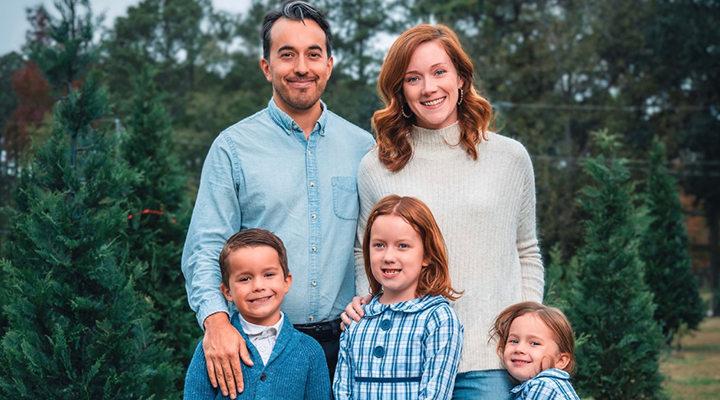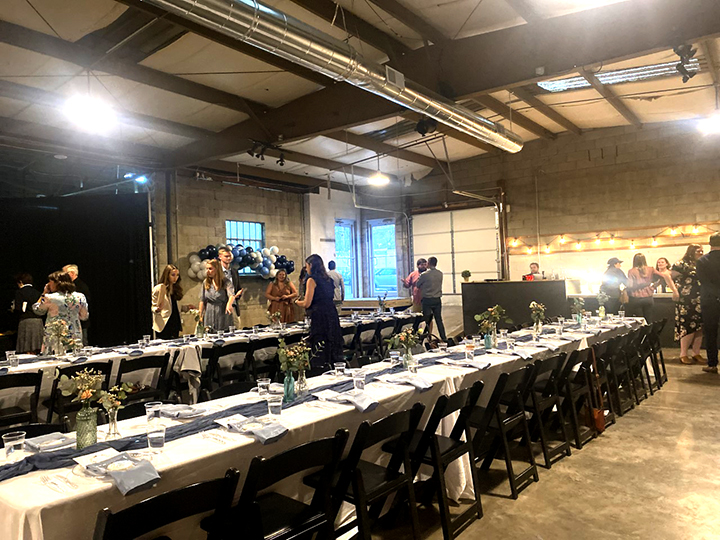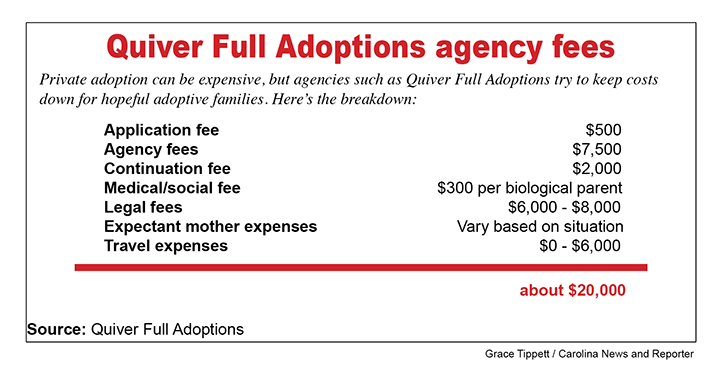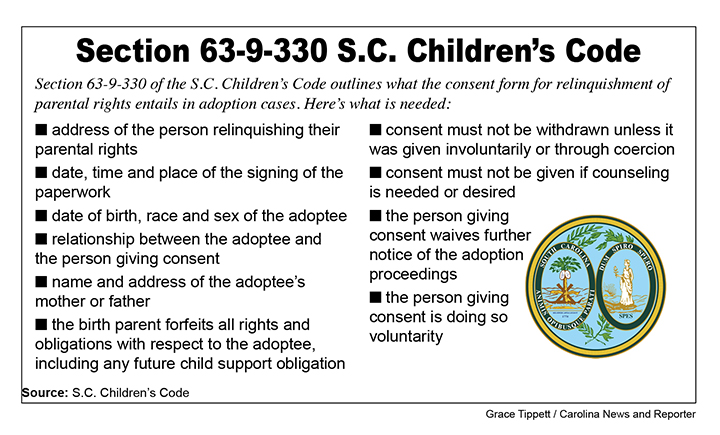Jake and Lucy Blair are hoping to grow their family through adoption. Expectant families considering adoption and supporters of the family can follow their journey on Instagram @theblairsadopt. (Photo courtesy of Lucy Blair)
Jake and Lucy Blair have wanted to adopt a child since before they got married.
The couple has three biological children: an 8-year-old girl, a 6-year-old boy and a 4-year-old girl.
In May, the couple received the news they had been praying for. An expectant mom chose Jake and Lucy to adopt her child after she gave birth.
Over the next few months, the couple prepared to bring a fourth child into their family.
“We started talking with this expectant mom, getting to know her, making plans,” Lucy Blair said. “She invited me to be with her in the hospital room when she gave birth.”
To find their child, the Blairs worked with a faith-based agency out of Greenville that connects expectant mothers with potential adoptive families.
When the July due date came, Jake and Lucy Blair drove to Greenville to be with the expectant mother for the birth and to meet the baby boy.
The child was supposed to go home with the Blairs. But the night before being discharged, the mother decided to keep her baby.
“She changed her mind and decided she couldn’t go through with adoption. So she went home with her baby, and we drove back to Columbia,” Lucy Blair said.
“In the moment it was devastating,” she said. “Just our worst nightmare. To get as far as we did get and like, naming him and holding him and everything was tough. But having some space, having a few months now between that moment and now, I just feel complete peace that that is not the child that was meant for our family.”
What the Blairs experienced is called a “disrupted adoption.” Disrupted adoptions are less likely when families go through the state, because the state terminates parental rights before the children are available for adoption. Some S.C. families choose to work with private adoption agencies because many of them only handle infants, which most families prefer.
Lucy Blair wanted to keep details about the expectant mother’s situation and personal information private but said, “there were some things about her specific situation that led us to just find that it would be incredibly difficult for her to not parent this baby.”
“We had already been praying for her and for this child for a while that she would feel supported enough to parent him,” she added.
While the Blairs have made peace with the outcome, their youngest child still wonders what happened.
“They just kind of took it really hard,” Lucy Blair said, referring to her three children. “It was very confusing for them to be prepared for a baby brother, and know his name, and see where he’ll sleep, and talk about how things are about to change. And then Mom and Dad go to bring him home, and then they come home, and he’s not there.”
THE PRIVATE PROCESS
The Blairs are continuing with their quest to adopt.
They are still working with Quiver Full Adoptions, a private agency that works outside of the state’s foster care and adoptions systems. Families wanting to adopt, such as the Blairs, look at files of potential birth mothers and choose who they would like to pursue. Birth mothers, likewise, see the files of potential adoptive parents. If a match is made, they will meet. The birth mother ultimately decides who takes the child.
Over past year, the Blairs have seen information on about 37 potential adoptions. They have said yes to 22 of those 37. They have only been chosen by one birth mother.
Private adoption is an expensive process and a concern for the Blairs.
Throughout the pregnancy, the chosen adoptive family may assist the biological mother financially by covering expenses such as housing, medical care and utilities.
“When families like us get an email with all the information about an expectant mom considering adoption, we can see right off the bat from that first email what her anticipated financial needs are,” Lucy Blair said. “And there have been a couple of times that my husband and I have said ‘no’ and have chosen not to be presented to a woman because her anticipated needs were just way more than we could handle at the time.”
During the Blairs’ disrupted adoption process, the child’s mother was financially stable and had a solid living situation. The only thing they were asked to pay for was a small phone bill.
When the child is born, the birth mother has about 48 hours to sign adoption papers relinquishing her parental rights to the adoptive family.
“Even if she invites me into the hospital room … and I’m holding the baby, the baby is still entirely hers, and not mine, if she hasn’t signed the papers,” Lucy Blair said.
The organization makes sure the woman has time to recover and is free of any medication before making the final decision.
“She spent like two and a half days in the hospital recovering with him right there by her side, spending a lot of time with him,” Lucy Blair said. “So you can imagine probably a lot of women start having second thoughts at that point.”
The majority of adoptions through Quiver Full are infant adoptions.
Quiver Full did not immediately return an email or a phone call seeking comment. But, according to its website, the average private domestic infant adoption costs upward of $40,000. The agency says its average adoption costs, however, are around $20,000.
Here is Quiver Full’s breakdown of fees for hopeful adoptive families:
- Application Fee: $500 application to the waitlist.
- Agency Fees: $7,500 in agency fees when a hopeful adoptive family comes off the waitlist and becomes an “active family.”
- Continuation Fee: $2,000 continuation fee to renew their contract for an additional 12 months if a hopeful adoptive family has not been chosen by an expectant family within 12 months of becoming active.
- Medical/Social Fee: $300 for a medical and social history of the expectant mother. If the expectant father is also involved in the adoption, they will pay another $300 for him.
- Legal Fees: $6,000 – $8,000 depending on the situation.
- Expectant Mother Expenses: vary based on the biological mother’s situation and can include any living or quality of life expenses.
- Travel Expenses: $0 – $6,000, depending on where the biological family and adoptive families live. This includes any hotel stays, plane tickets, gas, etc.
PUBLIC ADOPTION NEEDS
The public process differs substantially.
“There’s more research and, I would say, scrutiny involved with public adoption, as opposed to a private adoption,” said Connelly Anne Ragley, the S.C. Department of Social Services’ director of communications and external affairs.
The goal of the public system is to reunite foster children with their birth parents, which is different from private adoption agencies.
As of Dec. 6, 464 adoptions had been finalized in South Carolina, with more were expected to be finalized by the end of the year. Greenville County saw the most, with 104 adoptions.
The data only includes public adoptions finalized through the Department of Social Services. The department does not keep track of the state’s private adoption numbers.
Ragley said the greatest adoptive needs are for teenagers, sibling groups and children with complex medical situations.
“We have about 100 youth that are waiting for their forever home right now,” Ragley said. “So their parental rights have been terminated, and they’re sitting in a foster home waiting for someone to adopt them.”
Ragley said families that go through the public adoption process receive a $2,000 stipend from the state to assist with legal fees.
As the possibility of stricter abortion laws loom, many are wondering how the change will affect adoptions in South Carolina.
“One of the things that I know the Legislature is looking at is just trying to think of an overhaul of the adoption process in general,” Ragley said.
She said lawmakers are taking a look at laws concerning both private and public adoption routes to make sure the system is functioning in a beneficial way.
If biological parents decide to relinquish their parental rights to an adoptive family, they are not allowed to change their minds at any point after the paperwork has been finalized.
Lucy Blair said South Carolina helps make adoption easier than other states.
“Our laws are actually some of the most adoptive-family friendly,” Lucy said.






